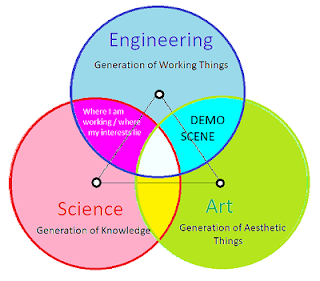Three Branches of Creative Activity: Engineering - Art - Science

Today, I have had an ingenious idea that has helped me a lot find out what I am really striving for. Here is the result of this idea: This image shows the three branches of creative activity humans perform: Engineering, Art and Science. There are, of course, many other things human beings do (e.g. healthcare, politics, military,...), but those things are not creative. Being creative does not mean that you have to draw a painting that looks good or compose music. That is only one branch of creativity - Art, where aesthetics matter. But Science and Engineering are fields of creative activity, too. So you can actually be creative - create something - without having an aesthetic intuition, e.g. by writing a scientific paper or working out a mathematical proof, or by creating a mechanism or building a machine that works. Engineering is the Generation of Working Things. That means, what matters is that the result works. The difference to Science, which is the Generation of Knowledge
